- Vitamin A Supplement Delivery Formats
- The Different Types of Vitamin A
- How to Choose a Vitamin A Supplement
- The Three Best Vitamin A Supplements
- Vitamin A Supplements We Don’t Recommend
- Potential Benefits of Vitamin A Supplementation
- Potential Side Effects of Vitamin A Supplementation
- Vitamin A Supplement FAQs
- The Best Vitamin A Supplements: Final Thoughts
High-quality vitamin A supplements can help optimize an already-healthy immune system, as well as improve eye health, skin health, gut health and more. Unfortunately, most of the products on the market today are made from synthetic vitamin A that is poorly absorbed by the body and which is therefore unlikely to provide any of those benefits.
When choosing a vitamin A supplement, your goal should be to find one that is in a natural and active form — in other words, something that is as close as possible to how it would appear in nature.
In this article, I’ll outline the different types of vitamin A supplements you’ll find when shopping and talk about the main criteria to look for when choosing between products. I’ll also list the three best vitamin A supplements based on their potential effectiveness, as well as a number of supplements you want to stay away from.
Vitamin A Supplement Delivery Formats
Vitamin A supplements come in many delivery formats. Here are the pros and cons of each format on the market today.
As a general rule, capsules are the best option, though softgels and liquid drops may be high-quality products depending on what’s in them.
Given the number of options on the market within these three categories, there’s no reason to choose any of the others mentioned below.
- Capsules. Typically made from whole food sources of vitamin A, capsules are usually the best choice because they do not contain any inflammatory seed oils (such as vegetable oils), fillers or binders (like magnesium stearate).
- Softgels. Can be a good choice because they’re easily absorbed, but they often contain undesirable fillers like seed oils. Plus, most of these products are made with synthetic vitamin A. They usually do not contain any unhealthy binders, however.
- Liquid drops. Liquid drops feature a variety of types of vitamin A, but most of them use synthetic vitamin A. One advantage of this format is that it absorbs very well if you place it under your tongue. I recommend sticking with organic products that are made with coconut or MCT oil instead of vegetable oil.
- Tablets. Can be made from whole food sources, synthetic vitamin A, or extracted vitamin A. It’s usually best to avoid vitamin A tablets because these products contain potentially unhealthy fillers like magnesium stearate.
- Gummies. Vitamin A gummies are usually combined with other synthetic nutrients like vitamin D, vitamin K, and/or B vitamins that your body absorbs poorly. Also, gummies contain many hidden sugars (like glucose syrup) and vegetable oils, so I recommend avoiding them.
- Sublingual. Designed to melt quickly under the tongue. Since the mouth is capable of absorbing vitamins readily, this is a great format to take if you want to assure the best-possible absorption. Unfortunately, while this format is convenient, it contains artificial sweeteners and fillers such as magnesium stearate, mannitol and citric acid.
Here’s a comparison table for quick reference.
| Format | Easily absorbed? | Fillers and additives | Dosage to get to 5,000 IU of vitamin A | Contains natural vitamin A? |
|---|---|---|---|---|
| Capsules | Yes | None | 4-8 capsules | Yes |
| Softgels | Yes | Seed oils | 1-5 softgels | Varies |
| Liquid drops | Yes | MCT oil, potassium sorbate, glycerin | 5-10 drops | No |
| Tablets | No | Magnesium stearate, silicon dioxide, microcrystalline cellulose | 1-6 tablets | Varies |
| Gummies | Yes | Sugar, glucose syrup, natural flavors, citric acid, seed oils | 2 gummies | No |
| Sublingual | Yes | Magnesium stearate, mannitol, citric acid | 1 tablet | Yes |
The Different Types of Vitamin A
There are several types of vitamin A to choose from.
Preformed Vitamin A (Retinol)
Whole-food vitamin A (retinol) comes from natural sources such as beef liver and cod liver. This is the best type of vitamin A because it contains other nutrients, including fatty acids, that enhance the vitamin’s absorbability and effectiveness.
Note that beta carotene supplements, while natural, are not actually vitamin A. Rather, these contain provitamin A that the body has to convert to vitamin A first.
That conversion process dramatically limits the bioavailability of the resulting vitamin A.
Beta Carotene (Provitamin A)
Provitamin A isn’t as effective as active vitamin A because it requires five metabolic steps to become active in the body, and various genes that control the metabolism of provitamin A can make this process very inefficient.
While it’s true some forms of provitamin A (such as beta carotene, lutein and zeaxanthin) can have protective effects in the eyes — especially with regard to conditions like macular degeneration — this protective effect isn’t because of the vitamin A itself, but rather because beta carotene, lutein and zeaxanthin are antioxidants.
Extracted Vitamin A
Natural vitamin A extract — in the form of retinol — can be found as purified vitamin A in supplements, but it is challenging to locate.
Most often, vitamin A extracts are synthetic and found as retinyl palmitate or retinyl acetate.
Natural vitamin A as retinol is healthier for the skin than retinyl palmitate or retinyl acetate, according to research.
Synthetic Vitamin A
Synthetic vitamin A is also known as retinyl palmitate or retinyl acetate. This is a common ingredient in many multivitamins and vitamin A supplements. While it’s easier for the body to use than beta carotene, it requires more steps to become active in the body compared to extracted vitamin A/natural retinol.
How to Choose a Vitamin A Supplement
When choosing a vitamin A supplement, you should keep the following features in mind.
- Type of vitamin A contained in the supplement. Not all forms of vitamin A are equal. You should choose vitamin A as retinol if possible. Research shows that synthetic vitamin A (retinyl palmitate or retinyl acetate) and beta carotene are less effective.
- Dosage. A good rule of thumb to use when supplementing with vitamin A is that you should aim for levels around 50-100% of the Recommended Daily Intake (RDI), or 1,500-3,000 IU per day. However, there are health conditions that may require more or less than that. For example, women with heavy periods, people with compromised immunity, vegetarians and people with digestive issues may need more vitamin A.
- Additional ingredients. Avoid vitamin A products with added fillers or preservatives, such as magnesium stearate, artificial sweeteners and soybean oil.
- Allergens and/or dietary incompatibility. Some vitamin A products contain common allergens like soy lecithin, gluten and corn. Additionally, gelatin capsules are derived from animal cartilage and collagen, so while gelatin isn’t considered an allergen it may not be compatible with plant-based diets.
- Natural preservatives. These prevent oxidation and the formation of free radicals and are therefore not something you need to watch out for. Examples of natural products commonly found in vitamin A supplements can include natural vitamin E and rosemary extracts. Natural vitamin E is listed as such, or is often labeled as d-alpha tocopherol.
The Three Best Vitamin A Supplements
The best vitamin A supplements are freeze-dried beef liver, cod liver oil and vitamin A drops.
1. Freeze-Dried Beef Liver
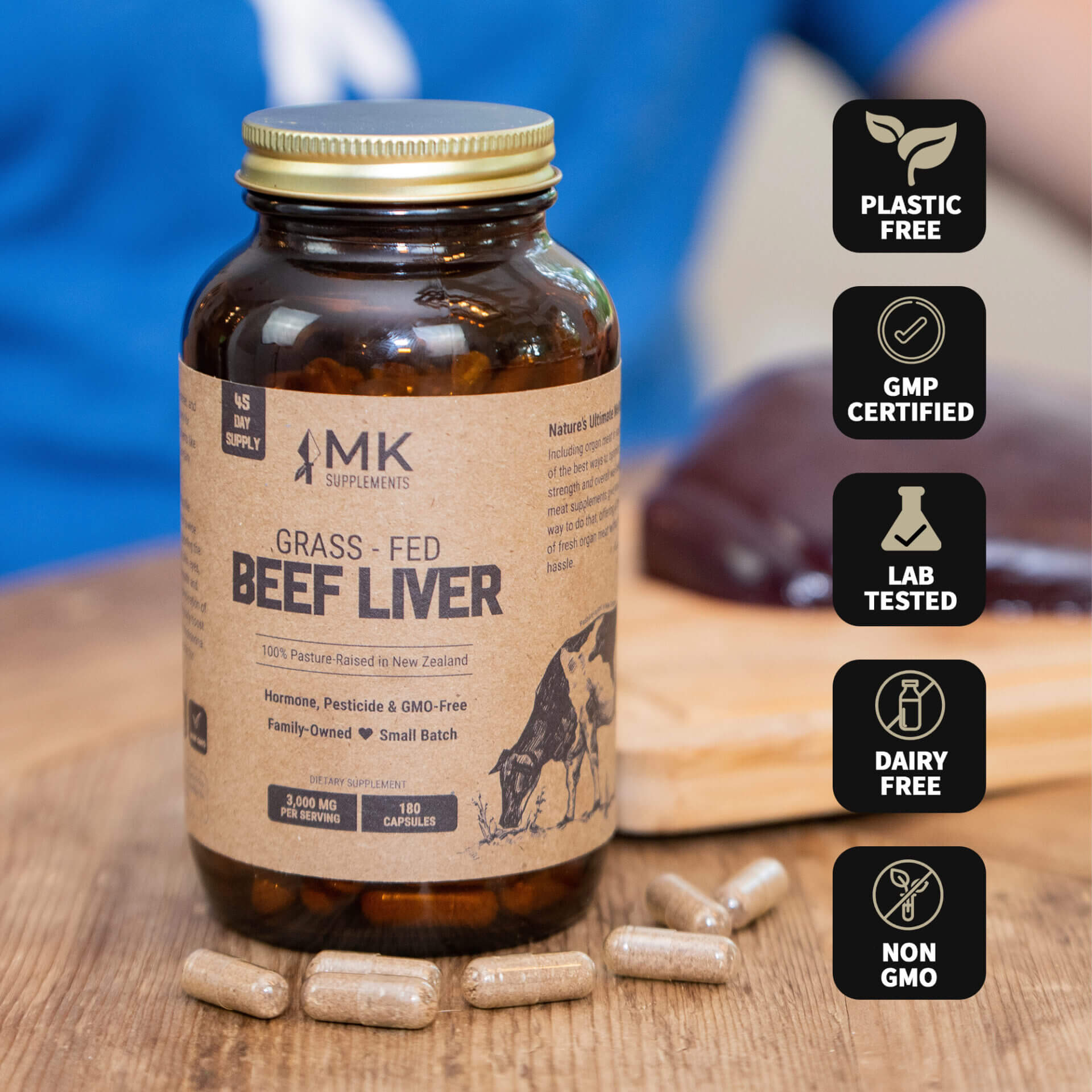
Freeze-dried beef liver is nature’s perfect, natural source of vitamin A. The freeze-drying process helps to retain and preserve the nutrients within the liver (as opposed to harsher processing methods that utilize chemicals or extreme heat).
Typically, beef liver supplements contain around 50-100% of the recommended daily value of vitamin A per serving.
Pros
- Contains all-natural vitamin A and also has fatty acids that enhance the effectiveness of vitamin A.
- Contains joint-healing and skin-healing compounds like hyaluronic acid, glucosamine and collagen.
- Free from dairy and major allergens.
Cons
- You must take multiple capsules per day to obtain enough vitamin A.
- People with hemochromatosis, or iron overload syndrome, should avoid using freeze-dried beef liver.
As a potent source of vitamin A (retinol), beef liver provides protection for the body by reducing free radicals and supporting healthy energy, and is helpful for a healthy liver as well. In fact, beef liver contains more vitamin A than almost any food on the planet, short of seal liver or polar bear liver.
Research even shows that taking a natural form of vitamin A like liver enhances the bioavailability of iron. So, beef liver really is the perfect delivery system for these nutrients because it contains high amounts of both iron and vitamin A.
On a personal note, since I’ve been taking freeze-dried beef liver regularly, my lab results are the best they’ve ever been. This includes my liver function tests.
- Our top pick: MK Supplements Beef Liver (our own small-batch brand).
- More options: Ancestral Supplements Beef Liver, Enviromedica Beef Liver, and Perfect Supplements Desiccated Liver.
- Learn more: Read Michael’s article about why eating organ meat is beneficial and check out his list of the best beef liver supplement brands to find even more product recommendations.
2. Cod Liver Oil
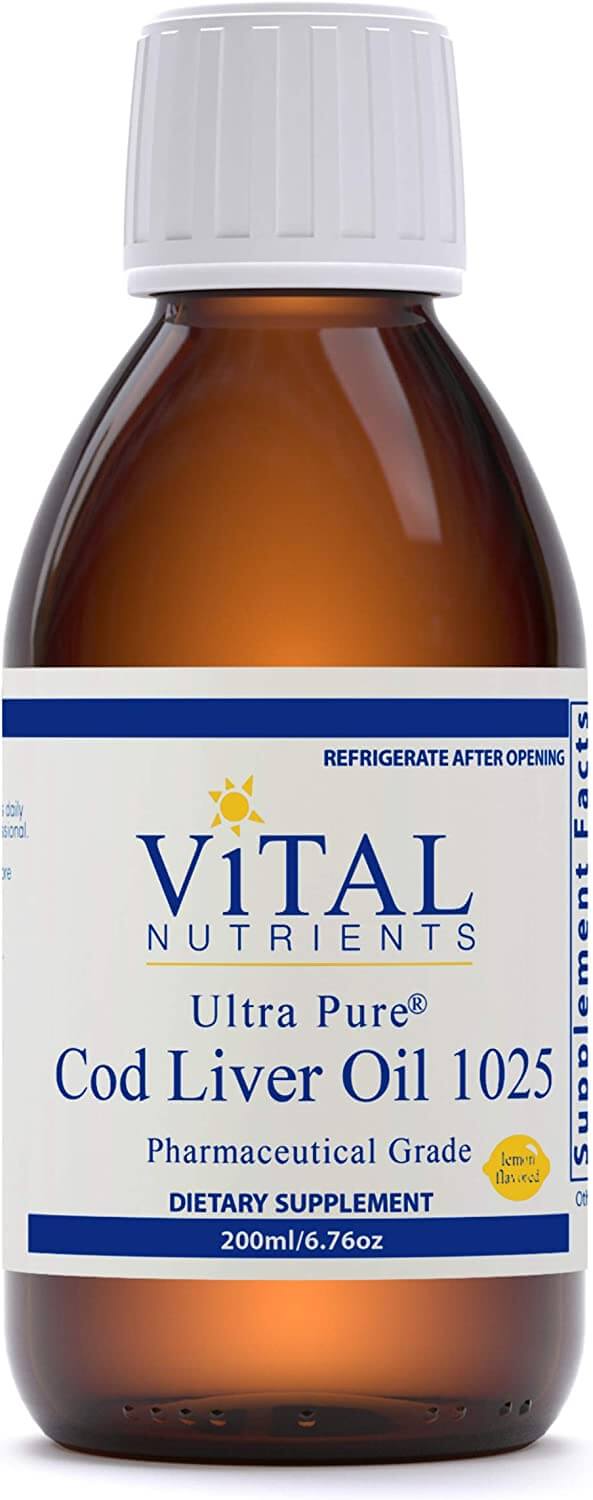
Cod liver oil is naturally high in vitamin A, vitamin D and omega-3 fatty acids. However, quality can be an issue, so you have to choose carefully when buying cod liver oil supplements.
Interestingly, vitamin A and omega-3 fatty acids enhance each other’s effectiveness in the body.
Pros
- Cod liver is naturally very high in vitamin A, as well as omega 3-fatty acids that are highly absorbable.
- It’s easy to find cod liver oil that is free of major allergens.
- You usually don’t need to take many pills to get a good dose of vitamin A.
Cons
- Many cod liver oil products remove some of the natural vitamin A, so it loses its effectiveness.
- Cod liver oil is easily oxidized, which can make it rancid, even among trusted brands.
- Synthetic vitamin A is often added to cod liver capsules.
Like freeze-dried beef liver, cod liver oil is a natural vitamin A supplement. However, it can be fraught with issues due to rancidity — a condition that occurs when the polyunsaturated fatty acids (PUFAs) in the oil break apart (oxidize) due to exposure to air, heat or sunlight. When that happens, the PUFAs can cause inflammation, thus negatively impacting your metabolic health.
A couple things you can do to assure that your cod liver oil is high-quality include buying smaller bottles (so you use up the oil faster and reduce its exposure to air, heat and sunlight) and making sure that you’re not approaching the expiration date on the bottle when taking the supplement.
Also, make sure to refrigerate your cod liver oil to help reduce the chances that it will become rancid.
When you take cod liver oil supplements, the expectation is to get a pure marine cod liver oil that is fresh and unadulterated. In reality, this can prove somewhat difficult. Some cod liver products are so purified that they remove any natural vitamin A.
Unfortunately, the only reliable way to determine the processing method used for a particular supplement is to ask the manufacturer if they utilized high heat, solvents or chemicals during production.
Still, cod liver oil can be a valuable source of vitamin A and omega-3 fatty acids in your diet, so here are a few carefully selected top cod liver oil picks.
- Our top pick: Vital Nutrients Ultra Pure Cod Liver Oil.
- More options: Standard Process Cod Liver Oil Soft Gels and Jigsaw Health Alaskan Cod Liver Oil Softgels.
- Learn more: For more information about the benefits of cod liver oil, read my article about how to choose between cod liver oil vs fish oil.
3. Liquid Vitamin A Drops
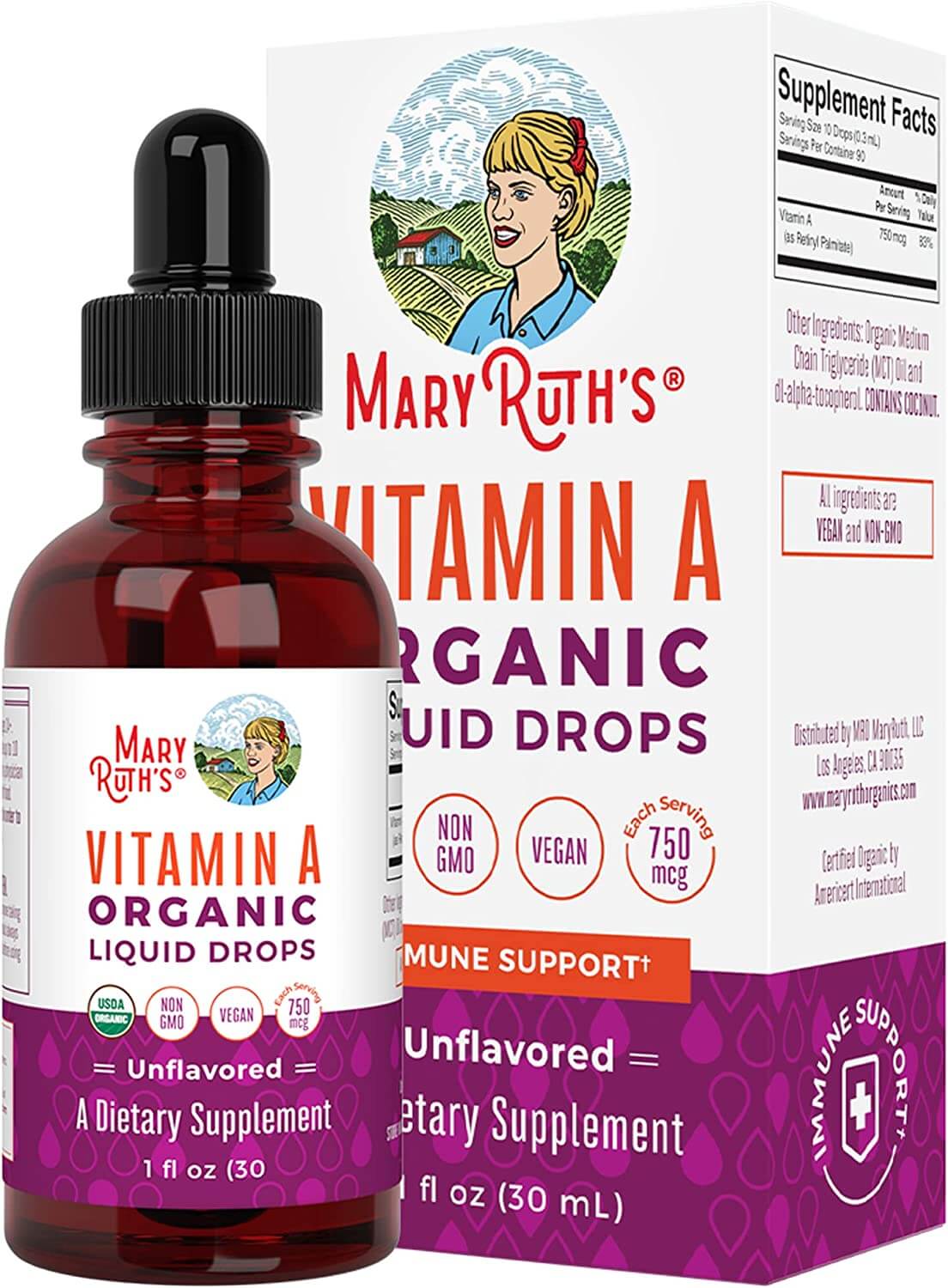
Liquid vitamin A drops are harder to find than capsules. However, they’re less likely to have additives or fillers, so they can be worth the extra effort to find — particularly for people on a plant-based diet who aren’t willing to use beef liver or cod oil.
Pros
- Relatively inexpensive.
- No pills are needed.
- Usually free of extra additives or preservatives.
Cons
- Liquid vitamin A is typically made from synthetic retinyl palmitate.
- Many people dislike the taste of liquid vitamin A.
- Doesn’t contain nutrient cofactors like freeze-dried beef liver does.
If you’re looking for a vitamin A supplement that isn’t in pill form, liquid vitamin A drops are a reasonable option. Additionally, when taking vitamin A drops, you usually only need a small serving size (a major plus considering their famously bad taste). They also happen to be the most economical way to get extra vitamin A into your diet.
However, liquid vitamin A is usually made synthetically. And unlike freeze-dried liver capsules or cod liver oil, it doesn’t contain any other nutrient cofactors such as vitamin D, omega-3 fats or B vitamins. So if you choose to take liquid vitamin A, you should make sure to also get enough of these other nutrients.
- Our top pick: MaryRuth’s USDA Organic Vitamin A Liquid Drops.
- More options: Why Not Natural Vitamin A Drops.
- Learn more: Read Weston Price’s “Vitamin A-mazing” article to learn about how vitamin A helps with almost every aspect of health.
Vitamin A Supplements We Don’t Recommend
Beta Carotene-Based Vitamin A Supplements

It’s a common misconception that fruits and vegetables are a good source of vitamin A.
Plants do not contain vitamin A at all, but rather carotenoids (such as beta carotene) that are precursors to vitamin A. This means that beta carotene and other carotenoids have the potential to turn into vitamin A, but may not do so in the body because they are also used for other purposes.
For example, beta carotene has its own antioxidant effects in cells and the body uses it to protect from free radicals during exercise. However, this means that beta-carotene may get used up before it turns into vitamin A in the body.
Not only that, a large percentage of people do not metabolize beta carotene well, due to numerous genetic variations.
So, using beta carotene isn’t as effective as natural vitamin A from liver sources.
Sublingual Vitamin A and Vitamin A Gummies
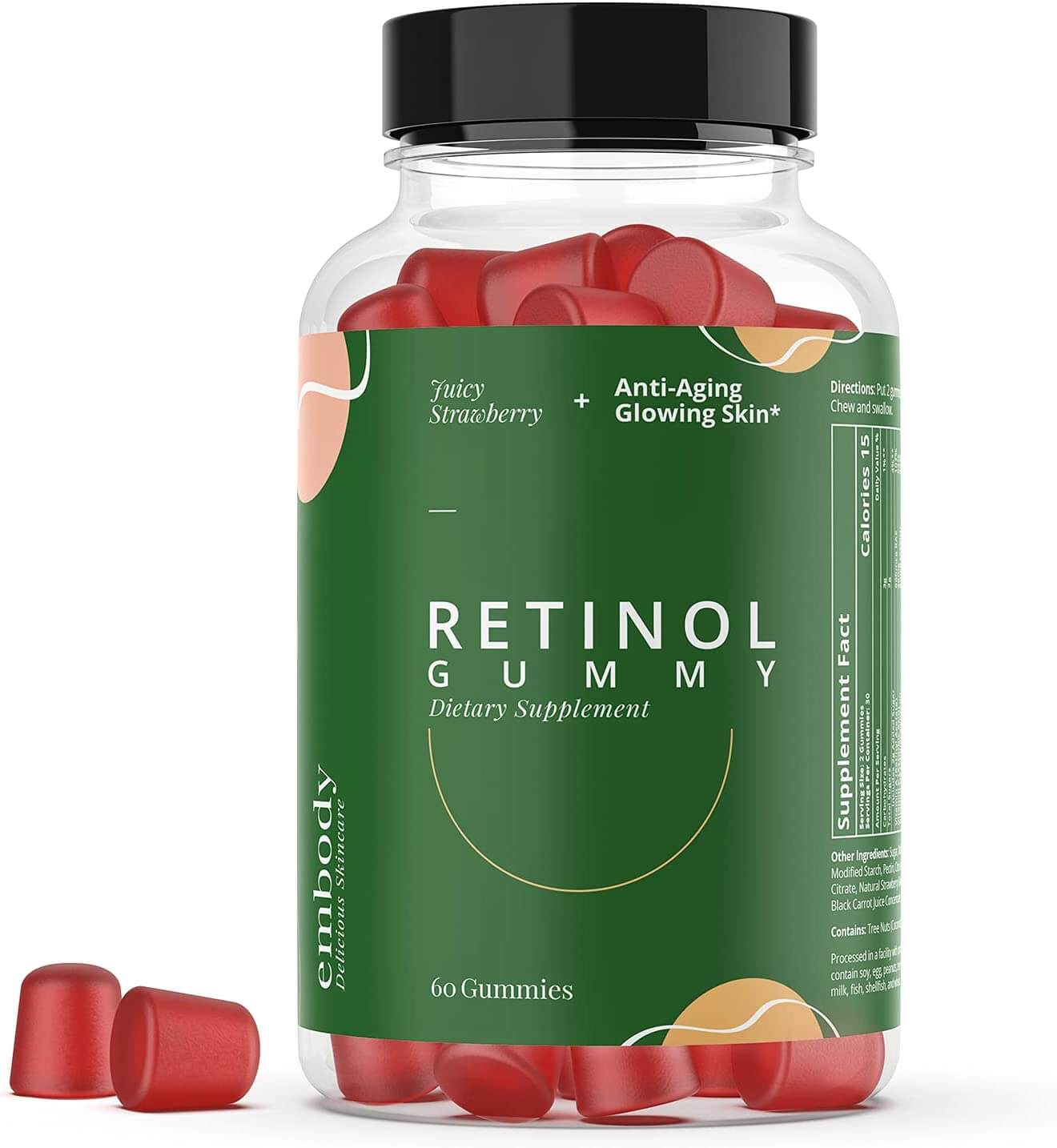
While sublingual vitamin A and vitamin A gummies may taste delicious because they’re sweet, they have more fillers, processed ingredients, and additives than the products we recommend in this post. For this reason, it’s best to stick with freeze-dried beef liver, cod liver oil and vitamin A drops.
Potential Benefits of Vitamin A Supplementation
There are many potential benefits of vitamin A supplementation.
- Vitamin A is critical in maintaining a healthy immune system. This is because vitamin A helps to build a strong gut lining and respiratory tract lining. This critical nutrient is also essential for both innate and adaptive immune function. Simply put, vitamin A is one of the most critical tools that your body has to help fight infections.
- One common benefit is improved health of the skin, hair and nails. For example, people may experience less acne, less dry skin, and less dry eyes when using these products. As an antioxidant and potent nutrient, vitamin A protects the skin because it fights free radicals and helps make the skin a more protective barrier. In fact, vitamin A deficiency is linked to increased risk of skin infections and inflammatory skin conditions.
- Eye health also requires plenty of vitamin A. This is because your eyes need vitamin A to protect against free radicals. Not only that, vitamin A as retinol works better than beta carotene in improving night vision, which helps you to see well in the dark. Research shows that vitamin A is beneficial in helping nourish the eye and reduces the risk of age-related macular degeneration.
- While research is still early, vitamin A deficiency may increase the growth of fat cells, leading to increased weight gain and obesity risk.
- Vitamin A likely helps to increase the health of the gut microbiome and the health of the skin microbiome.
- Using vitamin A supplements can help reduce the risk of heavy menstrual periods and is used to treat heavy periods.
Potential Side Effects of Vitamin A Supplementation
It is possible to get too much vitamin A, which results in vitamin A toxicity. However, vitamin A toxicity is extremely rare, with only 10 cases per year on average.
To avoid excess vitamin A, aim to get around 10,000 IU per day of vitamin A or less from supplements and make sure to take it with nutrient cofactors. Some research even shows that daily doses of vitamin A at a level of 25,000 IU per day is safe.
By getting enough vitamin D and other nutrients, you reduce your risk of too much vitamin A. The best way to do this is to eat nutrient-rich foods like beef liver and supplement vitamin A as needed.
Vitamin A Supplement FAQs
It’s relatively difficult to tell if your body has enough vitamin A. You can’t effectively measure blood levels of vitamin A because many factors can make these blood tests inaccurate. So, the only way to really know if you’re getting enough vitamin A is to focus on eating close to the recommended daily intake (10,000 IU per day) from foods that are rich in vitamin A — or by taking vitamin A supplements.
There are many reasons why your body may not be getting enough vitamin A. For example, if you have any digestive issues, you may not be absorbing vitamin A well. Common digestive issues include gallbladder problems, liver problems, leaky gut or inflammatory bowel diseases.
Even if you have a healthy digestive tract, vitamin A is difficult to absorb. A high fiber diet also binds vitamin A, making it unable to absorb all of the vitamin A from your foods.
Other factors that can lead to low vitamin A levels include:
– Being on a high protein diet (or drinking a lot of protein shakes). This is because the more protein you eat, the more vitamin A your body needs.
– Taking vitamin D supplements. Both vitamin D and vitamin A use the same receptors in the body, so if you get too much vitamin D, it can crowd out vitamin A in your cells.
– Consuming a diet that’s high in omega-6, as most Americans do. High intake of omega-6 fats increase oxidative stress in the body, so it likely increases your vitamin A needs.
Beef liver and other types of liver, such as chicken liver, are the best sources of vitamin A among foods that are readily available today. As a reference, two ounces of fresh beef liver contains about 100% of your daily vitamin A needs.
Other foods that have a moderate amount of vitamin A are wild-caught salmon, pastured eggs, mackerel, 100% grass-fed butter and cheese.
Based on my clinical experience, taking vitamin A supplements tends to work fairly quickly for most people. You may notice a difference within a week to a month. However, this also depends on the health of your digestive tract, the foods in your diet, and how deficient you are when you start taking it.
Personally, I noticed within a month that my body felt better from taking a good vitamin A supplement like beef liver.
Yes. Vitamin A is a nutrient that is essential for growth and development, so vitamin A supplements in moderate doses are safe for pregnant women.
Because beef liver is the most nutritious food out there, with over 25 vitamins and minerals in it, you can safely use freeze-dried liver supplements when you’re pregnant. Humans have eaten liver as part of ancestral diets forever.
Just make sure to stick to a 1 to 2 ounce serving of liver per day, or 3 to 6 grams of a freeze-dried liver supplement if you’re pregnant to avoid getting too much vitamin A. And make sure you’re getting enough vitamin D as well.
You should also make sure you check with your healthcare provider before adding any supplements beyond your prenatal vitamin when you’re pregnant.
The Best Vitamin A Supplements: Final Thoughts
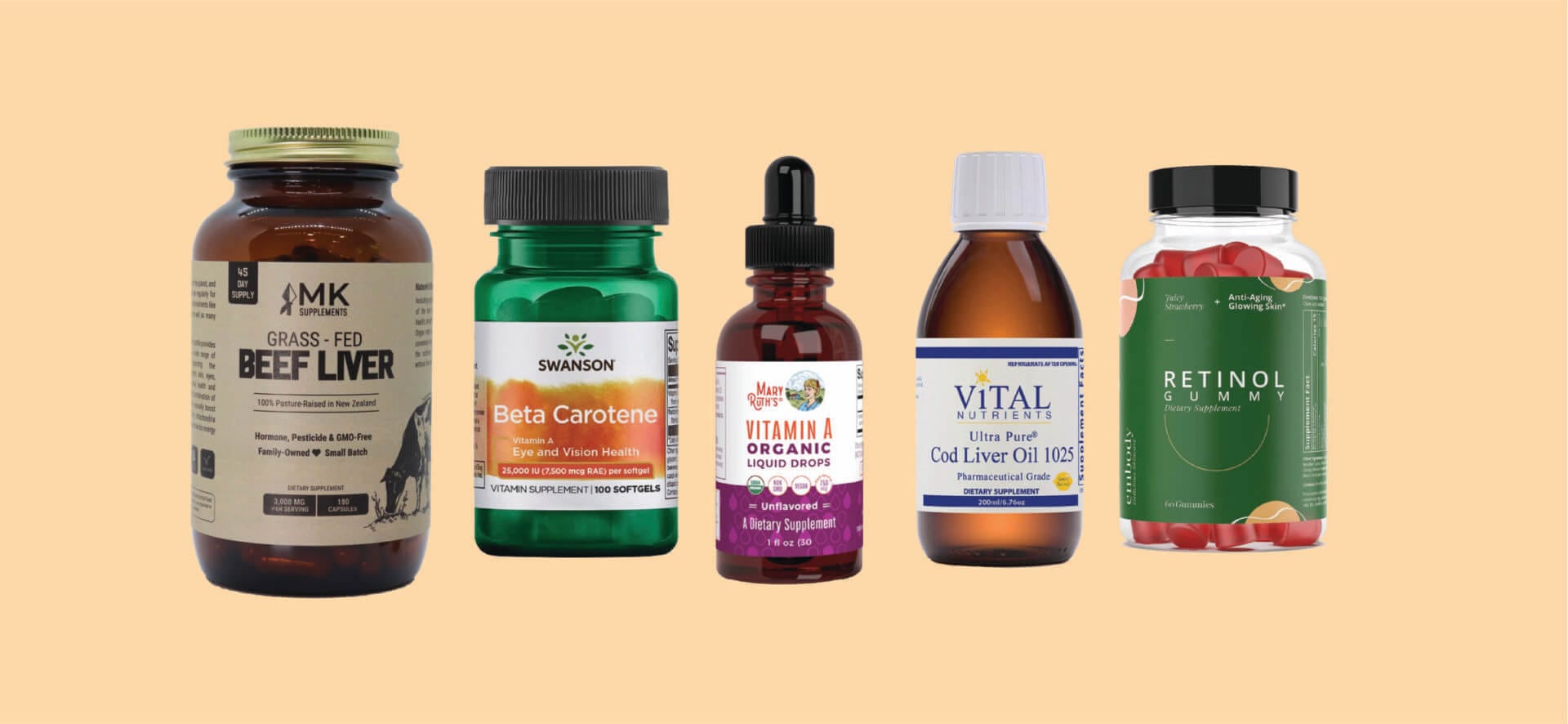
There are many reasons to consider adding a vitamin A supplement into your diet, including immune health, antioxidant benefits, skin health and eye health.
And many people are deficient in vitamin A without knowing it — especially if they have digestive issues, are vegetarian, take fiber supplements, or follow a high-protein diet.
To get the best vitamin A supplements, look for freeze-dried beef liver, cod liver oil and vitamin A drops. As a rule, vitamin A capsules are the ideal option, though softgels and drops may be useful in certain cases.
But keep one thing in mind: dietary supplements — no matter how high quality they are — cannot fix an unhealthy diet or lifestyle. These products should be used to optimize your well-being, not to try to cover for poor dietary choices. It’s always best to get the vitamins and minerals your body needs from whole food sources (with organ meat being the best possible choice.)

Heidi Moretti is a registered dietitian with decades of experience in healing patients through functional nutrition. She’s the author of four books, has Master’s of Science in Nutritional Sciences from the University of Washington, and is the founder of the wellness website The Healthy RD.

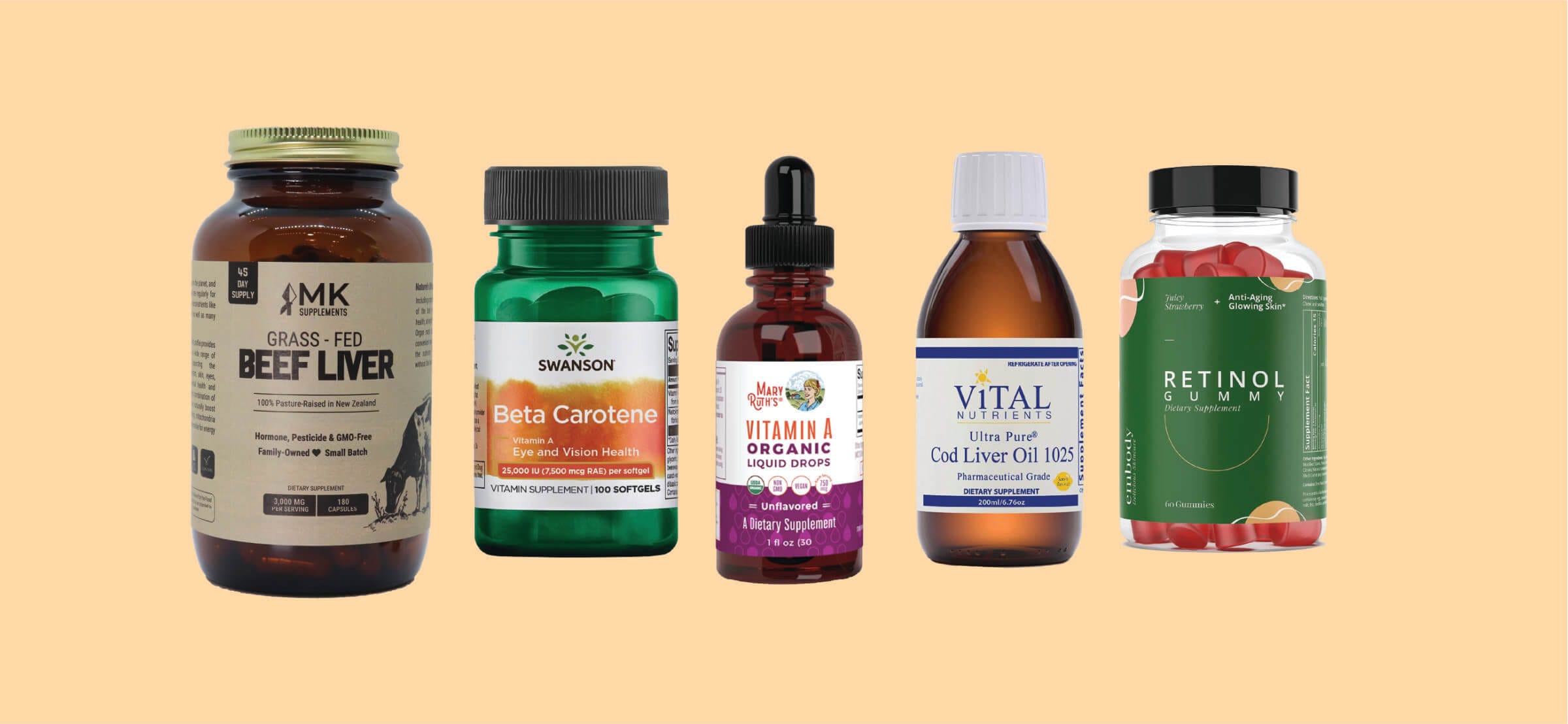

Hi Michael,
Where does one who doesn’t eat meat and need supplementation find natural supplements without synthetic ingredients and fillers?
Thanks for advice.
Hi Iza,
by no meat you mean no fresh meat and no beef organ supplements? Unfortunately, I have no experience with non-animal-based supplements that don’t contain synthetic ingredients. Most regular multivitamins are made in the lab. Sorry but you’ll have to do some digging to see if there is anything out there that made from real food. Just keep in mind that certain vitamins don’t exist in the plant world, at least not in effective amounts. So getting heme-iron, B12, Choline, Retinol or K2 into your body from plants will be a challenge.
Cheers,
Michael
I use Nature Made. I have a vitamin D deficiency. I take their Supper C . I don’t like tablets but it also has vitamin D3, A and zinc. I also take their D3 with K2. what do you think?
Hi Edward,
Nature Made, like most other vitamin supplement manufacturers use synthetic ingredients and fillers I don’t recommend. It’s OK to supplement with D3 in winter (we use a product from Thorn) but you should get all other vitamins and minerals from whole-food sources. If fresh food (organs) aren’t an option, go with freeze-dried beef organs such as the ones we make at MK Supplements. Beef Liver covers your vitamin A, K2 and zinc and Heart & Spleen has enough vitamin C. See shop.michaelkummer.com.